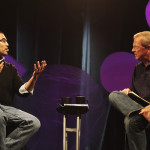Why I Loved to Listen to Christopher Hitchens
by Bishop Robert Barron
Filed under New Atheists
I have, over the years, playfully accused some of my atheist interlocutors of being “secret Herods.” The biblical Herod arrested John the Baptist but nevertheless took pleasure in listening to John preach from his prison cell. So, I’ve suggested, the atheists who come to my website and comment so acerbically and so frequently on my internet videos are, despite themselves, secretly seeking out the things of God. I will confess to having a certain Herod syndrome in reverse in regard to Christopher Hitchens (who died December 15, 2011). Though he was certainly the most outspoken and biting critic of religion in the last 50 years, and though he often infuriated me with this cavalier and insulting dismissals of what I hold most dear, I will admit that I loved to listen to him.
I think I watched every Hitchens debate that I could find on YouTube; I subscribed to Vanity Fair largely because Hitchens was a regular contributor; I read every one of his books—in fact, I’m currently plowing through his paving-stone sized collection of essays called Arguably (Twelve, 2012); and I delighted in watching him thrust and parry with news interviewers from across the political spectrum, who just could never seem to get a handle on him. Part of the attraction was what the ancient Romans called gaudium de stilo (delight in style).
No one wrote quite like Christopher Hitchens. Whether he was describing an uprising on the streets of Athens, or criticizing the formation of young men in the British boarding schools of the 1950s, or defending his support of the Iraq war, or begging people to let go of what he took to be their childish belief in God, Hitchens was unfailingly intelligent, perceptive, funny, sarcastic, and addictively readable. Another part of the appeal was that his personality was always massively present in what he wrote. There was absolutely nothing detached about a Hitchens book, article, or speech. Rather, his aggressive, inquisitive, cock-sure, irritated, delightfully alert self was consistently on display. Also, Hitchens and I liked a lot of the same people and topics: Evelyn Waugh, contemporary politics, religion, and above all, Bob Dylan. But what I appreciated most about Christopher Hitchens was his passion for God. I realize this might require a bit of explanation!
One of the fundamental mistakes that Hitchens and his new atheist colleagues consistently made in regard to religion was their misconstrual of what serious believers mean by the word “God.” Time and again, the new atheists mocked God as a “sky fairy” or an “invisible friend,” and they argued that religious belief was tantamount to accepting the existence of “a flying spaghetti monster,” a wild mythological fantasy for which there is not a shred of evidence. Or they ridiculed religious philosophers for proposing, over and again, a pathetic “god of the gaps,” a supernatural cause fitted awkwardly into a schema of explanation that science would eventually clarify in its own terms. In all of these ways, however, they missed their mark.
For the classical theological tradition, God is not a being in the world, one object, however supreme, among many. The maker of the entire universe cannot be, himself, an item within the universe, and the one who is responsible for the nexus of causal relations in its entirety could never be a missing link in an ordinary scientific schema. Thomas Aquinas makes the decisive point when he says that God is not ens summum (highest being) but rather ipsum esse (the sheer act of being itself). God is neither a thing in the world, nor the sum total of existing things; he is instead the unconditioned cause of the conditioned universe, the reason why there is something rather than nothing. Accordingly, God is not some good thing, but Goodness itself; not some true object but Truth itself; not some beautiful reality, but Beauty itself. And this helps us to see how Christopher Hitchens, despite his protestations, actually loved God.
What you couldn’t miss in Hitchens’s writing and speaking was a passion for justice, a deep desire to defend those who were denied their rights. This comes through from his first book on Cyprus and Greece to his articles in defense of his friend Salman Rushdie to his recent essays and speeches on the Iraq war. Where does this passion come from? What makes sense of it? If there is no God, which is to say, no unconditioned justice, no absolute criterion of good and evil, why precisely would someone burn with righteous indignation at violations of justice? If we are here simply by dumb chance, if all of us will one day die and simply fade away, if the earth will one day be incinerated and the universe spins away without purpose and in utter indifference to human cruelty and human nobility, why would anyone finally bother? Wouldn’t in fact Dostoyevsky be right in saying that if there is no God everything is permitted? My point is that the very passion for setting things right, which burned so brightly in Christopher Hitchens, is a powerful indicator that he was, whether he acknowledged it or not, connected to unconditioned justice. And that connection brought him very close indeed to what serious believers mean by God.
Soon after Hitchens revealed that he had been diagnosed with a very aggressive form of cancer, I wrote a piece for the CNN Belief Blog in which I urged my fellow Christians to pray for him. The article, which I considered rather benign, awakened a furious response on the part of Hitchens’s allies. More than 2,000 respondents told me, effectively, to leave Hitchens alone and not impose my “medieval mumbo-jumbo” on their hero. I didn’t abide by their recommendation. I prayed for Hitchens throughout his illness, and I pray for him now—a man religious despite himself.
Related Posts
Note: Our goal is to cultivate serious and respectful dialogue. While it's OK to disagree—even encouraged!—any snarky, offensive, or off-topic comments will be deleted. Before commenting please read the Commenting Rules and Tips. If you're having trouble commenting, read the Commenting Instructions.













